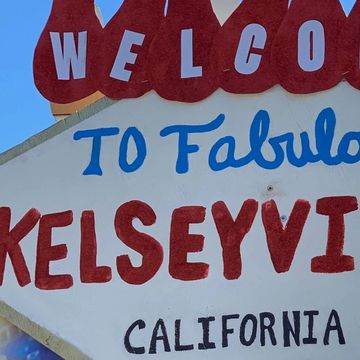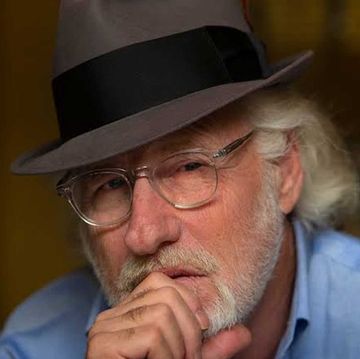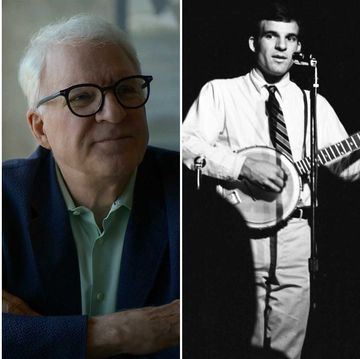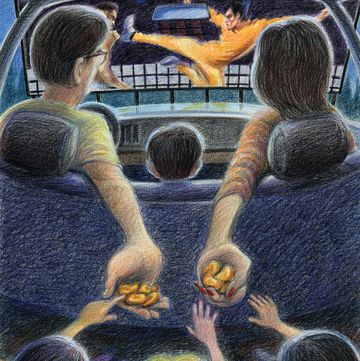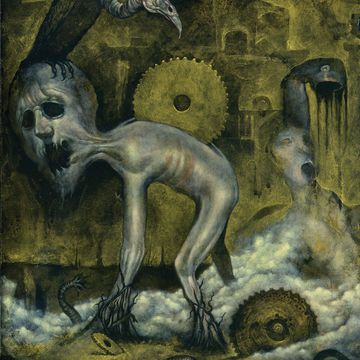Percival Everett is looking for his next novel. It’s a Wednesday morning in January, and he’s sitting on the patio of a South Pasadena coffee shop with a copy of Dvořák’s Prophecy, a book by cultural historian Joseph Horowitz about the Czech composer Antonín Dvořák, who, in 1892, moved to New York to become the director of the National Conservatory of Music of America. Part of Dvořák’s brief, Everett is explaining, was “to help composers establish an American music and not just repeat European, or German, classical romanticism.” In the process, he created his own version of the music he was seeking, epitomized by his 1893 New World Symphony.
“I was wondering,” Everett continues, over a breakfast burrito and a cup of coffee, “how does this really sound so American?” To find out, he began to read. What he found was Dvořák’s belief that this new “American music” would “come out of Native American and Negro melodies, as he called them.” That discovery has led to a sort of authorial aha moment, in which a variety of threads Everett is exploring—“I’ve been studying music theory the last five or six months,” he says, “without knowing why”—have started to coalesce into the kernel of an idea. As an example, he gestures at Horowitz’s study, which sits on the table between us. “I get this book,” he concludes, “and much of the discussion circles around Mark Twain.”
Twain, of course, has also been on Everett’s mind of late; his 24th novel, James, which recasts Adventures of Huckleberry Finn from the perspective of Jim, appeared in March and is a brilliant rendering. It is also a work of astonishing ambition—even audacity—since Twain’s original is often regarded as something of a literary holy grail. “All modern American literature comes from one book by Mark Twain called Huckleberry Finn,” Ernest Hemingway claimed in 1935. “All American writing comes from that.” Such a statement is equally arguable and difficult to dispute. Without question, Twain’s novel has its issues, most of which involve the long gap in its composition, from 1880 to 1883, during which time the author worked on The Prince and the Pauper and Life on the Mississippi.
“You can see the break,” Everett observes, citing Twain’s decision to bring the character Tom Sawyer back in the novel’s closing section, a choice the author labels “clearly mercenary.” He’s not wrong about that. Although as a work of fiction it is negligible, The Adventures of Tom Sawyer (1876) was hugely popular. Huckleberry Finn (1884) was—initially, in any case—intended as a sequel, and Twain would return to the well twice more, in Tom Sawyer Abroad (1894) and Tom Sawyer, Detective (1896).
With Huckleberry Finn, however, Twain uncovered something more profound and lasting. “All right, then, I’ll go to hell,” Huck avers late in the novel, after deciding to break Jim out of captivity. “I would go to work and steal Jim out of slavery again; and if I could think up anything worse, I would do that, too.”
This article appears in Issue 27 of Alta Journal.
SUBSCRIBE
The irony is that in flouting the law, Huck is also making a moral reckoning. This is the turning point, the book’s great declaration and discovery, Twain coming to understand something about slavery’s pernicious and pervasive influence that he seems not to have recognized with such clarity before. And yet, he also undermines that moment, by stripping Huck’s autonomy, his agency, once Tom appears. It is as if Twain’s imagination has failed him, as if he’s forgotten all that Huck has learned. His narrator recedes, becoming little more than Tom’s sidekick again.
Everett is quick to note that this was not the inspiration for James—to correct Twain’s narrative, as it were. “It’s a great, great novel,” he explains. “But when I thought about Jim, it’s kind of remarkable how even with that limited portrayal, he surfaces as a father figure to Huck, the only one in his life.” This is just one of the ways in which the character represents the moral center not only of Huckleberry Finn but also of Twain’s career. And yet, Everett observes, “no one had written anything from Jim’s point of view.” That was the starting point. “I kept looking,” he continues, “and it hadn’t happened. So I decided to do it.”
The intention, in that sense, is less to retell the story than to expand on it, to create a companion work that might exist in conversation with Twain and his characters as well as the torturous legacy of slavery and discrimination in the United States.
Everett has long occupied such a territory in his fiction, which is resolute in its desire to disrupt established pieties. The Trees, short-listed for a 2022 PEN/Faulkner Award, imagines a series of retributive murders of white supremacists in Mississippi, beginning with the families of the men who, in 1955, lynched 14-year-old Emmett Till. The book is both a broad satire of detective fiction and rural red-state bigotry and a deep and densely layered examination of racial violence. In one of its many daring sequences, a character named Granny C—she is Carolyn Bryant, whose claim that Till had wolf whistled at her precipitated his lynching—is found dead at a crime scene. (The actual Bryant did not die until 2023.)
Erasure, meanwhile, published in 2001 and the source of Cord Jefferson’s film, American Fiction, released in December, offers an allusive portrayal of Thelonious “Monk” Ellison, a professor and experimental novelist (not unlike Everett himself) who, provoked by the success of a novel called We’s Lives In Da Ghetto, composes his own exploitation saga, My Pafology, a title he later amends to Fuck. Published under the name Stagg R. Leigh, the book becomes a critical and popular sensation, by turns proving and refuting its own point. Everett makes his case by including the full text of My Pafology, a novel within the novel, as well as an earlier text, a lecture Monk delivers on postmodernism (or maybe post-postmodernism) that, in the insularity of its jargon, becomes essentially unreadable, a signifier for all the ways language can be manipulated, can appear to tell us something when in fact it tells us nothing at all.
“The fun part about it,” Everett says, laughing softly, “for me, anyway, is [that the lecture] is meaningless. It’s a mere exercise in language. But the fact that it’s a mere exercise in language sort of negates the fact that it’s meaningless. So that’s the fun I have.”
What Everett is evoking is the inner landscape of a work of fiction, not the story so much as the words. He is an expressive and immersive writer, in whose books language becomes a character of its own. We see this in Erasure, which is in many ways about language, how it is used, how it can pigeonhole us; Monk’s brief impersonation of Stagg R. Leigh leads nowhere but to madness, in both the novel and the film. And we see it, too, in James, which, among its other movements, toggles between the way its Black characters behave and speak when white people are present and the way they do when white people are not.
“I have,” Everett insists, “as most writers do, this fascination with language. But I have a more philosophical fascination with how language works. Not how prose works, but how it is we can make these sounds or make these marks and have somebody know what we are saying. And once I establish that as my focus, it becomes part of humanity, so when you are in the presence of an oppressive enemy, you find ways to speak to each other that your enemies don’t understand.”
Such a set of textures sits at the center of James; it is the heart of the novel, we might say. If one of the triumphs of Huckleberry Finn was the vernacularization of American language, Everett’s recasting seeks to operate in a more complicated register. He makes this clear in the opening chapter, when Huck and Tom talk in dialect, while Jim’s first-person narration of the scene is spare and erudite.
Everett writes:
“You cain’t jest take an old lady’s candles,” Huck said. “That’s stealin’. What if’n they blamed Jim for that?”
“Here, I’ll leave her this here nickel. That’s more’n enough. They won’t ’spect no slave. Where a slave gonna git a nickel? Now, let’s git outta here befo’ she shows up.”
The boys stepped out onto the porch. I don’t imagine that they were hardly aware of all the noise they made.
There’s a lot of play in that moment, a gleeful reframing of expectation, cultural and otherwise. There’s also a lot of rage. In that regard, the sequence recalls My Pafology, refracted through the other side of the looking glass. It’s no coincidence, I’d suggest, that Erasure begins with an epigraph from Twain—“I could never tell a lie that anybody would doubt, nor a truth that anybody would believe”—although when I ask about it, Everett pleads what he calls “work amnesia,” a forgetting of the motivations of each book as he moves into the next. Either way, he’s reminding me that we see only what we want to see, that the world is more complex and inchoate than we might like to think. Throughout the novel, Jim and the other Black characters speak with one another in formal diction, even as they instruct their children in how to speak among white people. “White folks,” Jim tells his daughter and six other children to whom he is teaching “a language lesson,” “expect us to sound a certain way and it can only help if we don’t disappoint them.… The only ones who suffer when they are made to feel inferior is us.”
This is a political gesture, language as a weapon or a fuse. What Everett’s saying is that the dialect he’s writing against emerges not from the condition of Blackness but rather from the condition of slavery. “It cheats all these characters,” he muses, “out of their intelligence and their humanity. That’s what I was after there. Also, the fact that no one speaks a perfect English. Everybody, everybody speaks what they learn.”
Everett’s point is that language is a source of power. This is why, by 1834, seven southern states had passed anti-literacy laws, mandating floggings and other punishments for Black people who learned to read or write. “That’s the threat,” Everett tells me. “It’s the threat and the weapon.” As to how this works, James makes a deft and nuanced argument. Jim can read already when the novel opens; it is one more secret he must keep to protect himself. On Jackson Island, where he flees after learning he’s about to be sold, he finds comfort in a small sack of purloined books. “At that moment,” he reflects, “the power of reading made itself clear and real to me. If I could see the words, then no one could control them or what I got from them. They couldn’t even know if I was merely seeing them or reading them, sounding them out or comprehending them. It was a completely private affair and completely free and, therefore, completely subversive.”
Not long before, he has written for the first time, beginning with the letters of the alphabet before moving on to words and sentences, which he inscribes in ink, using a cut stick as a stylus. “I am called Jim,” he affirms. “I have yet to choose a name.… I will not let myself, my mind, drown in fear and outrage. I will be outraged as a matter of course. But my interest is in how these marks that I am scratching on this page can mean anything at all. If they can have meaning, then life can have meaning, then I can have meaning.”
Two hundred pages later, Everett brings it all full circle, as Jim confronts Judge Thatcher regarding the whereabouts of his family.
“Why are you talking like that?” the judge asks Jim—or James, as he has come to call himself.
“I’m pointing a pistol at you,” James responds, “and you’re concerned with my speech? What is wrong with you?”
The answer, of course, is racism, which corrupts from the inside out.
What’s compelling is the way Everett uses all of this to implicate the novel as a form in its own right. He means to investigate not just what the story is but also who gets to tell it, who is allowed to use language to frame the world. That’s the discussion James and the judge are having, really, a discussion about freedom. The latter’s inability to understand this reveals the emptiness of his soul. If James can read and write, what does that say about the judge’s world? Considered through such a lens, James becomes a book less narrated than written; how else does the character’s language end up on the page? This is writing as pulse, as the beat of blood, as urgent as breathing.
This is writing that demands to be read.
Something similar might be said about Huckleberry Finn, which takes the form of Huck’s confession. “You don’t know about me without you have read a book by the name of The Adventures of Tom Sawyer,” the novel opens, “but that ain’t no matter. That book was made by Mr. Mark Twain, and he told the truth, mainly. There was things which he stretched, but mainly he told the truth.”
And yet this, too, is a framework Everett means to push against. James features many of the narrative tent poles of Twain’s novel: the death of Huck’s father, the raft and the Mississippi River, the Duke and the Dauphin. But in the end, it goes its own way. “I read Huckleberry Finn some 15 times in a row,” Everett tells me, “so that I would hate it and also—out of defense—forget it. There’s not a single line in there that comes from Huckleberry Finn.” What he means is that in order to tell this story, he had to use up the old language, Twain’s language, so he could invent a new one. He had to listen to the voice of James as it emerged.
Again, this brings to mind Erasure, where Monk must do something similar to create My Pafology, which is a satirical mash-up, of sorts, of Sapphire’s novel Push and Richard Wright’s Native Son. Voice, once more, or language, which is how character is defined throughout Everett’s fiction, the words we use, the patterns of our diction, determining the way we see the world.
Then there’s American Fiction, in which the novel is reframed through the medium of the motion picture, creating a story related to but not the same as the fiction, much like the relationship between Huckleberry Finn and James.
“I was not involved at all,” Everett says of the film, “except that I gave Cord Jefferson the rights because I liked him. He understood the book very well. I thought he really captured the spirit of the novel. But what I liked so much was that it’s really not my novel. He took what he needed to make his movie, which is exactly what he should do.”
After breakfast, Everett and I wander down Mission Street to his painting studio. As we walk, we return to Dvořák, which leads to a more general discussion of musical form. Everett plays jazz guitar, but here, as in literature, his interests are eclectic; in August, he will publish his seventh book of poetry, Sonnets for a Missing Key, inspired by Chopin’s preludes. The preludes, he says as he unlocks the door to the studio, “always bug me because they don’t lead to anything.”
A book of prompts, in other words.
Everett has long considered writing through such a lens; the reader makes the meaning, if there is meaning to be made. So, too, with his paintings, which are often large-scale and expressionistic. Lately, he has been making work for a new show, Redaction, which opens in April, and the studio is full of pieces in various stages of completion, swirls of color in shapes and splatters, a palette coated in thick clusters of oils. “Why I like painting and writing,” he explains, “is they’re so different. I like the physicality of the painting, the smells, that if I’m working on a really large canvas, I can be sore after, hurt my back. And I like abstraction. Painting lets me explore abstraction, which is why I like music, too, even more than painting. Music is really abstract because once you play it, it’s gone.”
He pauses for a moment, and it’s hard not to see this room as refuge. And why not? The world outside these walls is clamoring. James is among the year’s most anticipated works of fiction, Everett’s first with Doubleday after a lengthy tenure at Minneapolis’s Graywolf Press. The success of American Fiction has brought him to the attention of a broader audience. Still, as the South Pasadena morning lengthens, Everett appears to be precisely where he seeks to be. “Why do I write fiction?” he muses. “No idea, but I do. Why do I write a lot? I didn’t set out to write a lot. I just do. And I think that’s probably the reason I produce a lot, that I don’t feel any stress about this. We make work. And then we die.”•





